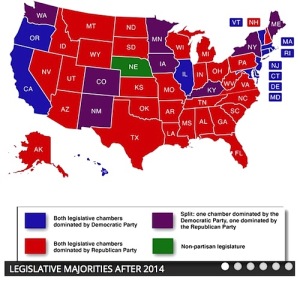Vermont’s free-market outlook marginally improved following election

GOP SWEEP: The 2014 midterm election saw power shift rightward in dozens of states.
By Bruce Parker | Vermont Watchdog
The Republican sweep has given high hopes to free-market advocates in Congress and in many statehouses.
But in Vermont, advocates of economic freedom say the election will provide only a limited boost to free-market solutions in the Green Mountain State.
Nationwide, Republicans made large gains on Nov. 4. The party took back the U.S. Senate, grabbed governorships in four Democratic-held states, and maintained a lock on 23 “trifecta” states in which they exercise total control.
While the shift right is expected to lighten industry-crushing regulatory burdens at the state and national level, free-market advocates in Vermont say the outlook for business has improved only slightly.
Unlike states like Maryland, Illinois and Massachusetts, which lost their Democratic leaders, Vermont watched Gov. Peter Shumlin eke out a win against his Republican challenger. In addition, GOPers picked up just two seats in the Vermont Senate and nine in the House. As it stands now, Rs occupy nine of 30 seats in the Senate and 54 of 150 seats in the House.
“The increased number will make the Blue Dog Democrats become a little more vocal in the conversation around the statehouse,” Senate Minority Leader Joe Benning, R-Caledonia, told Vermont Watchdog.
“The past four years we’ve been driven by the more ideological side of the Democratic policy regime. Now I think that the increased numbers of Republicans … will shift that conversation away from ideology and more towards practical solutions to solving problems.”
Benning said the change means economic development is going to rise to the forefront of the political conversation in Montpelier, and the state may finally get past the health care issue.
“The question of health care is going to finally be settled because businesses and the population in general are just tired of having the discussion,” he said.
House Minority Leader Don Turner, R-Milton, agreed the new makeup of the Legislature could have a positive, if limited, impact on business.
“Since we are still a large minority, we’re hopeful that the election will make some in the majority start to pay attention to the economy. We hope the governor got the message that we need to do something different, and we’re hoping to make Vermont’s business climate more business friendly,” Turner said.
According to the Milton Republican, continued uncertainty over health care means businesses “have no idea what to plan for.”
“Whether we stay with Vermont Health Connect or we go to the federal exchange, we have to make some decisions fairly quickly. We would like to see some stability. Let’s get this where people can afford what they’re doing for health care now and then not do anything for the next three to five years.”
Turner added that recent legislation regarding unemployment, paid sick days and other benefits costs employers money and prevents their ability to grow.
Paul Dame, of Essex Junction, a newly-elected freshman member of the House, believes many of his supporters sent him to the statehouse to lower the tax burden on businesses.
“One thing I found a lot of support for in my district was repealing the cloud tax. We have businesses like Dealer.com that are providing jobs and having a very low environmental impact. And yet what do we do to them? We added taxes to them, and now they’re hiring in Texas,” Dame said.
“I’ve talked to people, even some who described themselves as liberals, who said we shouldn’t be handicapping businesses like that.”
Rob Roper, president of the Ethan Allen Institute, a nonpartisan free market think tank, is less than optimistic about Vermont’s economic outlook.
“If businesses were hoping this election would offer some sort of tax or regulatory reprieve they’ll be disappointed,” he said.
Roper argues the national shift rightward ought to have had “a chilling effect” on tax-and-spend politicians, but he said Shumlin and other Democrats and Progressives are moving forward with single-payer, the carbon tax, the sugar-sweetened beverage tax and other agendas that will bury businesses and consumers with higher costs.
“If businesses want real relief, they need to see 2014 as a strong beginning, not a happy ending, and start looking ahead to 2016,” Roper said.
Jim Harrison, president of the Vermont Retail and Grocers Association, said members of his trade organization seek lawmakers of any party who will help lower their government-related expenses — especially those related to property taxes and health care.
“I think perhaps there’s a little more moderation to the Legislature, and results that work long term are often found in the middle. So we’re hopeful that the new makeup of the Legislature will allow us to work with members of both parties,” Harrison said.
“Does the election mean there will be less of an appetite for a government-run taxpayer-funded system? It’s really kind of early to know, but those are the kind of things we will be looking at.”
Harrison’s group, which represents about 800 retail stores and 250 suppliers, will be active at the statehouse to talk with lawmakers dedicated to creating a regulatory climate in which businesses can grow.
“We need to continue to work on having Vermont be an affordable place, not only for consumers but for businesses,” he said.
Contact Bruce Parker at bparker@watchdog.org







